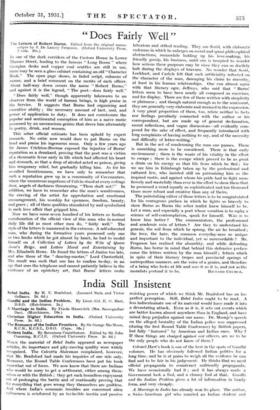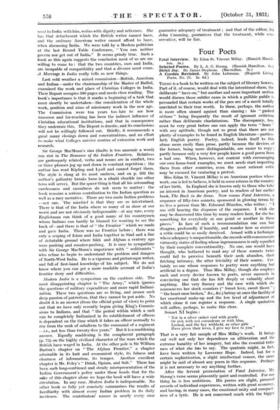India Still Insistent
(Leonard Stein and Victor
A Marriage to India. By Frieda Hausv:irl•h (Mrs. Sarangadhar
Das). (Hutchinson. 16s.) Christian Higher Education In India. (Oxford University Press. 3s. 6d.) WHEN the material of Rebel India appeared as newspaper articles, its importance and pity-moving quality were widely recognized. The Calcutta Statesman complained, however, that Mr. Brailsford had made his inquiries of one side only. Moreover, the Round Table Conferences have put his book somewhat out of focus. We now know that there are Indians who would be sorry to get a settlement, either among them- selves or with the British ; they get such boundless enjoyment out of prolonging the battle and of continually proving that for everything that goes wrong they themselves are guiltless. And where India's economic troubles are concerned alien callousness is reinforced by an invincible inertia and passive resisting power of which we think Mr. Brailaford has an im- perfeCt perception. Still, Rebel India ought to be read. A less indiscriminate use of its material would have made it into a devastating attack. Even as it is, it sets out events which are better known almost anywhere than in England, and have raised deep prejudice against our name. Dr. Moonjc's speech on the alleged brutality of the Indian police was suppressed (during the first Round Table Conference) by British papers, but fully "featured" by American and Indian ones. Why ? If these things are charged against our officers, arc we to be the only people who do not know of them ?
Colonel Hart's book is one of the best in the spate of Gandhi volumes. He has obviously followed Indian polities for a long time, and he is at pains to weigh all the evidence he can find and to be fair in his judgement. He thinks that we need official propaganda to counteract unfriendly propaganda. We have occasionally had it ; and it has always made a Government look a fool, and a clumsy fool at that. Gandhi and the Indian Problem .gives a lot of information in handy form,- and very cheaply.
A Marriage to India has already won its place. The author, a Swiss-American girl who married an Indian student and
went to India with him, writes with dignity and reticence. She has that detachment which the British writer cannot have, and the ordinary American writer cannot afford to have, when discussing India. We were told by a Moslem politician at the last Round Table Conference, " You can neither govern nor get out of India." It seems grimly true. Such a book as this again suggests the conclusion most of us are un- willing to come to : that the two countries, ours and India, are incapable of compatibility and that a divorce must come. A Marriage to India really tells us new things.
Last cold weather a mixed commission—British, American and Indian—under the chairmanship of the Master of Balliol, examined the work and place of Christian Colleges in India. Their Report occupies 380 pages and needs close reading. The book's importance is that it marks a beginning of a task that must shortly be undertaken—the consideration of the whole work, position and aims of missionary work in the new age. The Commission were ten years too late to see how immense and far-reaching has been the indirect influence of Christian educational institutions, and that in consequence they underrate this. The Report is drastic, and its conclusions will not be willingly followed out. Briefly, it recommends a great many closings down and concentrations, and an effort to make what Colleges survive centres of extension work and research.
Sir George MacMunn's sins (faults is too anaemic a word) run riot in The Romance of the Indian Frontiers. Relatives are grotesquely related, verbs and nouns are in conflict, two or three phrases jog up and down in constant repetition ; the author has read Kipling and Lyall and cannot forget them. The style is slang at its most undress, and on p. 332 the author's gallantry breaks loose in a ribald chuckle (no other term will serve). But the queer thing is that all his astounding carelessness and casualness do not seem to matter : the book remains a serious contribution to the Indian question as well as a racy narrative. There are two main Indian problems —not one. The mischief is that they are so intertwined. There is that of the India where so many of us show at our worst and are not obviously indispensable—at any rate, every Englishman can think of a good many of his countrymen whom Indians can hardly be blamed for wanting to see the back of—and there is that of " the Frontier " which we made and gave India. There was no Frontier before ; there was only a seeping of Islam and India together in Sind and a line of debatable ground where Sikh and Afghan a century ago were pushing and counter-pushing. It is easy to sympathize with Sir George MacMunn's impatience with " seditionists " who refuse to begin to understand the problem and dangers of North-West India. He is a vigorous and picturesque writer, and full of first-hand knowledge of his subject. We do not know where you can get a more readable account of India's frontier story and difficulties.
Modern India is a symposium on the cautious side. The most disappointing chapter is " The Army," which ignores the questions of military expenditure and more rapid Indiani- zation. These two questions are so living, and arouse such deep passion of patriotism, that they cannot be put aside. No doubt it is an answer (from the official point of view) to point out that we have only recently begun giving King's Commis- sions to Indians, and that " the period within which a unit can be completely Indianized in its establishment of officers is dependent on the time which it takes an officer normally to rise from the rank of subaltern to the command of a regiment —i.e., not less than twenty-five years." But it is a maddening answer. Equally maddening is the complacent paragraph (p. 72) on the highly civilized character of the wars which the British have waged in India. At the other pole is Sir William Barton's chapter on " The Afghan Frontier," a chapter admirable in its knit and economical style, its fulness and clearness of information, its temper. Another excellent chapter is Mr. Foley's " Drink, Opium, and Salt." There has been such long-continued and steady misrepresentation of the Indian Government's policy under these heads that for the sake of this chapter alone we hope the book will have a wide circulation. In any case, Modern India is indispensable. No other book so fully yet concisely summarizes the results of familiarity with almost every Indian problem in its daily incidence. The contributors' names in nearly every case guarantee adequacy of treatment ; and that of the editor, Sir John Cumming, guarantees that the treatment, while con- servative, will be fair.







































 Previous page
Previous page